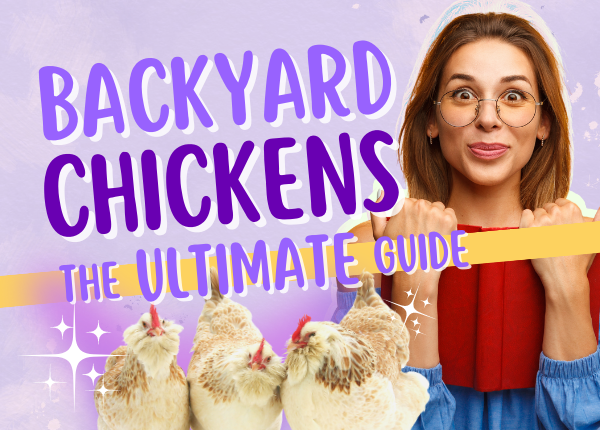
Chickens are taking over the ‘burbs!
It seems we’ve all twigged to the fact that we don’t have to own a farmhouse with 30 acres of land to keep these brilliant, egg-popping pets.
Backyard chickens are getting more and more popular for a reason: they’re pets that pay their way. The cost of living is going up and we’re all trying to be more eco-aware and self-sufficient.
Dogs don’t dish up donuts for us, and cats won’t cough up your morning coffee, just furballs. Hens, on the other hand, they’ll be happy to help you out with eggs for your tummy in return for their room and board, no free-loaders here!
Poultry popularity doesn’t just boil down to boiled eggs and budgeting. As far as pets go, chickens are relatively low maintenance, cheap to keep, and provide so much joy and entertainment that their eggs become a bonus.
They’re also fine to be home alone all day, which is perfect for busy suburban families.
Curious about Keeping Chickens? Find your answers right here!
“Should I Get Chickens?”
“Which Chickens?”
“How Many?”
“What Would I Need?”
“Are Backyard Chickens Worth it?”
SHOULD I GET BACKYARD CHICKENS?
I’ll have you feeling confident about your chicken choices in no time.
What Are Backyard Chickens?
Backyard chickens aren’t a breed of chicken, the term is used to describe small domestic flocks kept in people’s urban or suburban spaces.
Chickens are usually kept in backyards as pets and for a personal supply of eggs, occasionally they’ll be part of a little egg-trade cottage industry, and very occasionally for meat.
Am I Allowed to Keep Backyard Chickens?
Before you even allow the idea of keeping chickens to hatch, you’ll need to check you’re in a chook-friendly neighborhood.
Some counties don’t allow backyard chickens full stop, some have hoops you’ll have to jump through, and some limit your numbers.
In certain restricted urban areas, you’ll be able to keep hens, but not roosters, because of the noise.
Unless you’re planning on breeding your chickens at home then that shouldn’t be a problem, but it does mean that you would be sensible to buy sexed chickens rather than try your cluck with hatching eggs and have to rehome any roos.
Some counties allow chickens but dictate that they must be permanently confined: strictly no free-ranging! This will impact the breeds of chicken that you can keep in your coop since some breeds do better than others in confinement.
On top of county legislation, you might be restricted by local bylaws or neighborhood agreements. Your lease may dictate that livestock are a no-go, and landlords might not be happy with hens camping out in their yards.
The next thing to consider is your health. If any of your family members have respiratory conditions or autoimmune deficiencies, you should run your plan past your GP before heading off to the hatchery.
Is My Backyard Big Enough for Chickens?
Standard-sized chickens need about 4 square feet of coop space and 8 square feet of exercise space each.
To house a standard backyard flock of 3-4 standard-sized hens you’ll need at least a 12-square-foot coop and 24-square-foot run.
Don’t be tempted to squeeze too many chickens into a coop that isn’t big enough for them. Finding their place in the pecking order can be tricky enough for chickens, but if there’s no room to dodge out of the way of the boss then poultry politics can get nasty fast.
Bantam chickens make great backyard chickens since they need less space. Bantams need about 2 square feet of coop space, and 4 square feet of run space: that’s half the space of a bigger-bottomed bird!
If you have the room, always upsize your coop if you can. Better to have room for your flock to grow, since you’re bound to fall in love with the little crackers and end up sneaking more home in your handbag.
If you do have room for your chickens to free-range, then a slightly smaller run might not be an issue, so long as they’re able to exercise freely for a few hours each day.
Is Keeping Backyard Chickens Hard Work?
Everything’s easy when you know how! Keeping chickens is simple if you prepare well and stick to a routine.
The better clued up you are, the cheaper and easier life in Chickensville will be, and the less you’ll panic buy at midnight (we all do it).
Understanding your chickens' needs and common health issues can save you so much time, a fortune on unnecessary veterinary visits, and a lot of unnecessary heartache.
Sure, you can hit the search engine when something crops up – but would you know the early signs of an impacted crop, for egg-sample?
Knowing what to clook out for before problems develop makes the difference between prevention and cure.
You don’t need to buy fancy coops and automatic feeders, but you do need to invest in your knowledge. I can’t think of any better way to prepare for poultry parenthood than taking a reputable chicken keeping course like the ones available on Chickenpedia. You’ll learn all the stuff you need to know and none of the nonsense you don’t.
How Much Time & Effort Do Backyard Chickens Take?
Chickens won’t demand as much of your time and attention as a dog or a horse, but they’ll need more space and elbow grease than a pet hamster or rabbit.
You’ll need to check on your chickens a few times a day, top up their feeders and waterers, and harvest any eggs they’ve laid to stop them from going broody or crushing them.
Depending on their coop you might need to let them out of their nest box in the morning and close them up again in the evening to keep them safe from predators.
If you have a fancy-pants automated nest box your presence might not be obligatory, but what’s the point in keeping chicks if you’re not going to enjoy their company each day?
Most chicken keepers agree that once a week is enough for a full muck out of the nest box and coop, but this will depend on how many chickens you have and how much space they have to spread their poop around.
Poorly chickens will need more of your time and attention, and some are emotionally needier than others! They’re right little characters.
How Often Do Backyard Chickens Need Feeding?
Free feeding is the poultry version of an all-you-can-eat, and it’s the preferred feeding method for most keepers. Just keep their feeders topped up: your chickens can eat as and when it suits them, it’s easier, and you don’t need to panic if you can’t make it home for teatime.
If you want to control your chicken’s feed times, then they’ll need serving 2-3 times a day. Mornings and late afternoons are perfect as you get to start and end your day with a friendly flock who are very happy to see you (or what’s in the bucket!)
Feeding your chickens too late in the evening, when predators are about, means they may be too anxious to eat, or just ready for bed.
Do Backyard Chickens Smell?
Chickens don’t smell, but their poop does! I can’t sugar coat that one…but it’s not that bad if you keep your coop clean.
Chickens poop 3-4 times an hour, every hour! Each poop can be a couple of inches long. They can also be runny which makes quick clean-up missions problematic.
Three chickens equate to a poop every 5 minutes. You do the rest of the math!
“I can’t explain how stinky my gals get in the summer. I don’t think anyone who can’t be bothered to scoop a LOT of poop should even think about chickens” (Lara, Florida)
Are Backyard Chickens Noisy?
Chickens can be noisy, but not all chickens, and not all day.
A chicken’s cackle is about 60 decibels. That’s nowhere near as loud as a dog’s bark, so unless your neighbors have a problem with dogs too, don’t let them bug you about your birds. 60 decibels is only as loud as two people having a conversation.
With smaller backyard flocks it’s more likely that the noise might irritate you or your neighbors than it be a nuisance. They’re not pneumatic drills.
Hens cackle when they lay an egg, or sometimes when their coop-mates are laying an egg. I think they just want to be appreciated for their efforts, and I don’t blame them, those eggs can be big!
Hens only lay once a day, so it’s not a constant array of announcements.
Roosters will crow to alert their ladies to danger, and if you don’t have a rooster then your alpha hen might well take on this role.
How Often Do Backyard Chickens Need Mucking Out?
Your chicken coop will need cleaning out weekly. That means scooping the poop (did I mention the poop?), replacing their bedding and soiled litter, and cleaning their waterers and feeders.
Depending on the hygiene standards of your little individuals, you might have problem spots to clean monthly, but you shouldn’t need to deep clean your coop more than twice a year.
How Much Do Backyard Chickens Cost to Buy?
Chicks cost around 2-3 USD each.
The price fluctuates with breed, bloodline, and age, so they might cost more if you’re a fan of fancy feathers.
Laying Hens cost 20-50 USD.
If you want to skip the baby stage and get cracking with your morning omelets straight away then a mature hen is the way forward. They cost a little more to buy, but you’ll get egg-sactly what you’re expecting: no runts or roosters.
How Much Do Backyard Chickens Cost to Keep?
Keeping backyard chickens will cost 5 -10 USD per hen per month on average.
This should cover their feed, bedding, and any supplements they need like grit or oyster shells.
I’ve been crunching some numbers and – with all the ifs and buts in mind – I think that’s a fair figure for you to do your sums with.
Getting set up with your coop, feeders, and chicks can cost around 500 USD, and there will be one-off and annual costs which will primarily be vaccinations and healthcare, and you’re bound to have the odd expense like replacing a broken heater or repairing your fencing.
Backyard hens will cost around 150 USD per hen per year to keep, with these added annual expenses in mind.
Can I Keep Backyard Chickens on a Budget?
There are loads of ways to keep coop-care costs down.
If you’re handy with a hammer or find a pre-loved playhouse to repurpose then set-up costs can be minimal.
You can make your own chicken waterers, chicken feed, and even their bedding can be recycled wood chippings, newspapers, or hay.
Chickens can often be found free of charge if someone has too many for their coop or is navigating chicken politics. If you’re open to whatever breed needs a home or rescuing ex-battery hens, then you’ll be able to fill your flock with freebies.
PROS & CONS OF BACKYARD CHICKENS
“According to The National Sustainable Agriculture Information Service and experts in backyard agriculture, there are a host of personal benefits associated with urban agriculture and keeping chickens in one's own backyard.(Wikipedia)”
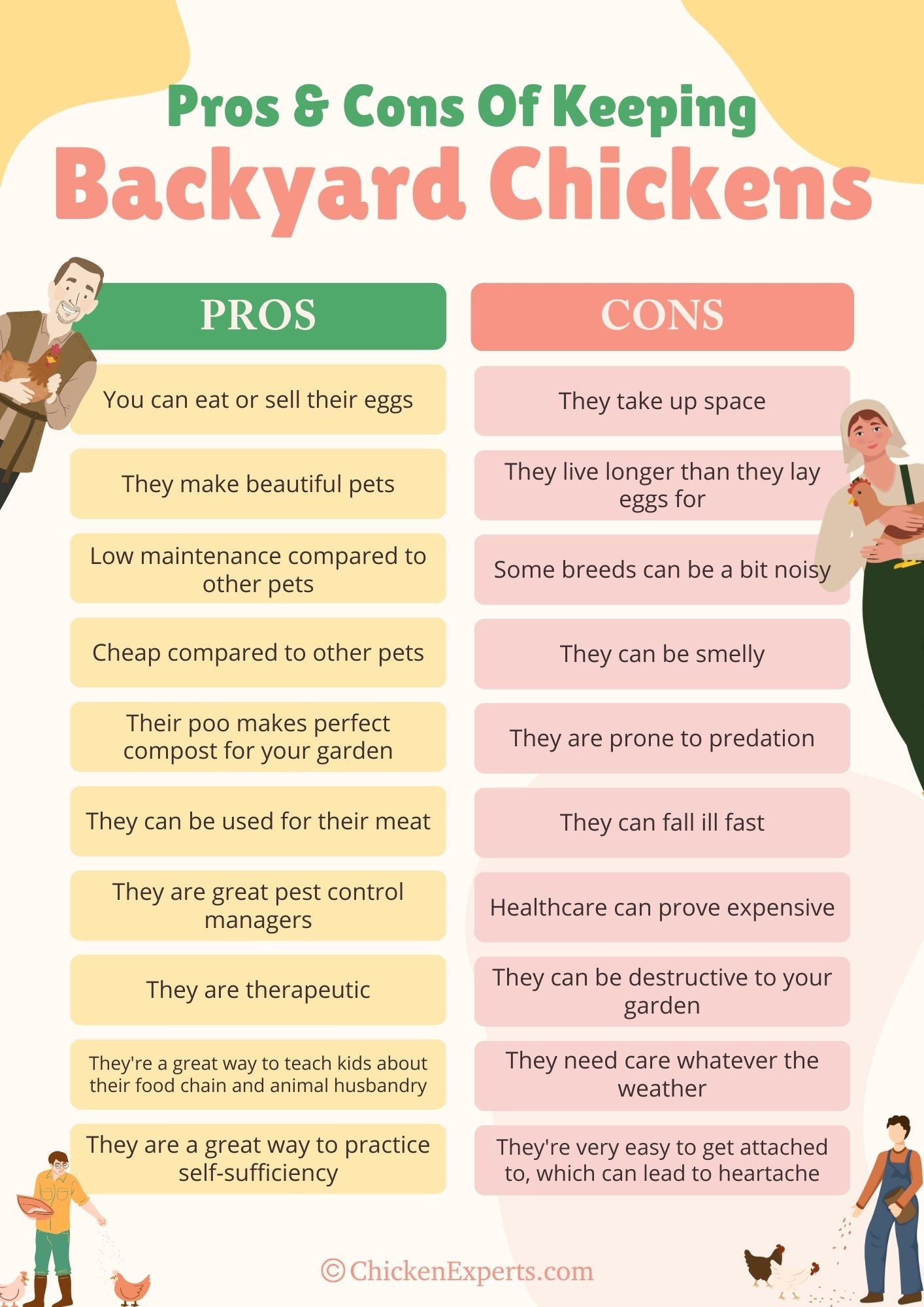
10 Benefits of Backyard Chickens
- Backyard chickens lay yummy scrummy eggs to eat or sell
- Backyard chickens make beautiful pets with fun and quirky personalities
- Backyard chickens are low maintenance compared to other pets
- Backyard chickens are cheap to keep compared to most other pets
- Backyard chickens’ poo makes perfect compost for your garden
- Backyard chickens can be used for their meat
- Backyard chickens are great pest control managers so can help your garden prosper
- Pets are therapeutic, and pets that bring you outdoors are great our health and wellbeing
- Keeping backyard chickens is a great way to teach kids about their food chain and animal husbandry
- Backyard chickens are a great way to practice self-sufficiency and lead a more eco-friendly lifestyle
10 Downsides to Backyard Chickens
- Backyard chickens take up space
- Backyard chickens live longer than they lay eggs for
- Backyard chickens can be a bit noisy
- Backyard chickens can be smelly
- Backyard chickens are prone to predation
- Backyard chickens can fall ill fast
- Healthcare can prove expensive
- Backyard chickens can be destructive to your garden
- Backyard chickens need care whatever the weather
- Backyard chickens are very easy to get attached to, which can lead to heartache
I asked some of our readers what The Best Thing About Keeping Backyard Chickens was, and here’s what they said:
PROs
“How excited they are to see me. It’s almost a stampede to the door to get to me” (Robin, L)
“I really love how they take themselves to bed a little after sunset. I say goodnight to them and close the door. So much easier than getting the kids to bed!” (Beverly, J)
“My favorite thing is watching them run to me. I often sing ‘The Race is On’ when they come running over for snacks.” (Sherry, H)
“Most Favorite thing is interacting and enjoying their shenanigans” (Rachel, N)
“Providing food for my family” (Erin, B)
“Being blown away by what incredibly affectionate and individual beings they are. I don’t think I will ever stop being in awe of that.” (Sara, F)
“Hatching babies and watching their colors and patterns develop as they grow” (Erin, Cl)
“Getting Eggs!” (Jane, K)
…and what’s The Worst Thing About Keeping Backyard Chickens?
“Next to cleaning their coop, my least favorite thing is losing one or many. I love my chickens so much and I get really sad when one passes away.” (Julie, W)
“When the little ninjas sneak into my flower beds!” (Sherry, H)
“When on gets sick, dealing with parasites and the least fun is the dirty butt baths” (Rachel, N)
“Least favourite is them having to live outside. They are all so sweet and bonded. It seems so unfair that all the other pets are cozy in here with us and they are out in the yard” (Sara, F)
“Least favourite part of keeping chickens is hauling buckets of water from the house to the coop for 80 birds in the middle of the winter and stressing about frostbite” (Erin, C)
“NOT Getting Eggs!” (Jane, K)
ARE BACKYARD CHICKENS RIGHT FOR ME?
You're bound to love the little fluff bombs, but are you ready to take on poultry parenting?
You should never commit to any animals half-heartedly, so it’s right to do a bit of soul searching before you head to the hatchery:
· Can you commit to raising them?
Chickens live for 6-8 years. If you just love the look of them but don’t fancy the long-term commitment, then chickens might not be right for your yard.
· Have you found the right breed for you?
Different chicken breeds are very different to care for and have unique traits to offer. Some breeds make for better pets, some don't grow too big, and some lay loads of eggs. Do your research.
· Can you afford chickens?
Chickens are affordable in the scheme of pets, but they still cost money to keep and care for. Chicken feed alone can cost around 40 USD a month for a flock of four chickens. There are one-off costs like a coop, a run, and feeding equipment to consider, and for raising baby chicks you'll also need a pricier starter feed and heater.
· Do you have the right lifestyle?
Are you an early bird, or are you always short on time? If you can't stand commitment, mess, or a bit of hard graft then chickens aren't your bag, baby.
· Is everyone in?
It's important to have support when you take on chickens because they'll be around for 6-8 years. Have the chat with your family and friends. Who will watch them if you go away on holiday?
· Are your neighbors onboard?
If you have nosey, or noise-averse neighbors then a rambunctious rooster and a coop of gobby girls may start a backyard battle. Look for quieter breeds like the Wyandotte, Seabright, or Brahma.
· Are you allowed to keep chickens?
Check your county laws, local bylaws, and lease terms.
· Will your other pets be cool with chickens?
Dogs and cats seem to either love or hate chickens. Either way, you can't take your eyes off them when they're new. Be honest with yourself. Nobody wants a blood-bath situation.
· Do you have enough space?
A small flock of 5-6 average-sized chickens will need a 5x4-foot coop and at least a 25-foot run. Do you have room for your chickens to roam freely and stay healthy and happy?
Still not sure? Sometimes it’s best to hear it from real experts…
WHAT BUSY BACKYARD CHICKEN KEEPERS REALLY THINK!
I asked some of our readers what The Best Thing About Backyard Chickens was, and here’s what they said:
“…Their eggs! Oh, they were the biggest, best, and most beautiful eggs I've ever eaten. Despite knowing how it works, seeing it happen in real life is another thing altogether. It was like magic, giving them food and water and having our breakfast materialize in their nesting box.” (https://www.treehugger.com/why-i-no-longer-have-backyard-chickens-4858560)
“How excited they are to see me. It’s almost a stampede to the door to get to me” (Robin Loftis)
“I really love how they take themselves to bed a little after sunset. I say goodnight to them and close the door. So much easier than getting the kids to bed!” (Beverly Joly)
“My favorite thing is watching them run to me. I often sing ‘The Race is On’ when they come running over for snacks.” (Sherry Hinkle-Carlson)
…and what’s The Worst Thing About Keeping Backyard Chickens?
“I started to feel terrible about the hens having limited space to roam, despite having done my research and confirming with their breeder that the space was sufficient. It felt unnaturally cramped and almost cruel to keep them in there.” (https://www.treehugger.com/why-i-no-longer-have-backyard-chickens-4858560)
“I hate dealing with their poop!” ((Beverly Joly)
“Next to cleaning their coop, my least favorite thing is losing one or many. I love my chickens so much and I get really sad when one passes away.” (Julie Wislon-Cogburn)
“When the little ninjas sneak into my flower beds!” (Sherry Hinkle-Carlson)
WHICH BACKYARD CHICKENS ARE BEST?
You’re going for it? Yeay! Welcome to Chickensville!
Sometimes in life, there can be too much choice. Pickin’ a chicken is one of those times!
It’s easy to get overwhelmed by all the options when you’re finding your feet with chickens. Individual chickens all have their bloodlines and personalities, but you can predict your poultries personality pretty well by knowing about their breed.
There are some beautiful breeds about, but if they don’t lay many eggs, they’re aggressive,
they can’t handle coop life, or they grow to the size of a small dinosaur, then picking your breed based on how Instagram-worthy they look is bound to lead to heartache.
The Best Backyard Chicken Breeds
With 463 recognized chicken breeds in the USA in 2022, I promise you there will be more than one great breed for you out there!
The perfect breed for your backyard will depend on your taste, climate, budget, and the amount of space and free-range capacity you have to offer.
Some breeds are higher maintenance or sicklier than others, some breeds are less chatty, lay more eggs, don’t mind the cold, or refuse to raise chicks. You can’t afford to skip your homework when you’re taking on an animal that will live with you for several years.
You can see an entire list of American Poultry Association accepted chicken breeds here, or if you haven’t got time to research hundreds of hens, then head to my quick but comprehensive chicken breeds blog for an introduction to the best of backyard chicken breeds.
Here are just a few breeds worthy of a quick name drop:
The 10 Best Backyard Chicken Breeds for Beginners
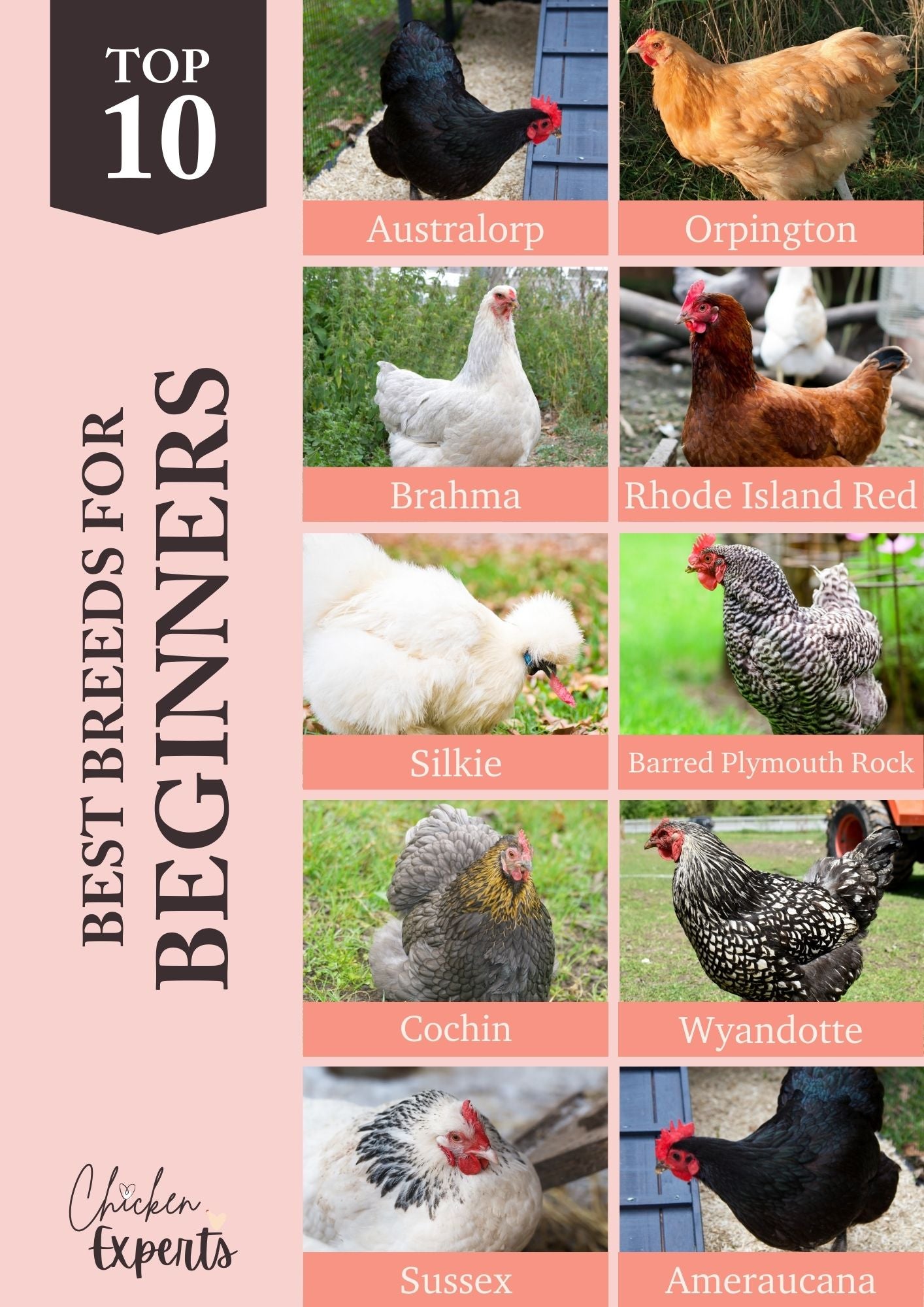
1. The Australorp Chicken
2. The Orpington Chicken
3. The Brahma Chicken
4. The Rhode Island Red Chicken
5. The Silkie Chicken
6. The Barred Plymouth Rock Chicken
7. The Cochin Chicken
8. The Wyandotte Chicken
9. The Sussex Chicken
10. The Ameraucana Chicken
The 10 Best Backyard Chicken Breeds for Eggs:
- Golden Comet Chicken @ 300 – 350 eggs a year
- Rhode Island Red Chicken @ 300 eggs a year
- Leghorn Chicken @ 250-300 eggs a year
- Plymouth Rock Chicken @ 280 eggs a year
- Jersey Giant Chicken @ 200 eggs a year
- Australorp Chicken @ 200 eggs a year
- Marans Chicken @ 200 eggs a year
- Delaware Chicken @ 200 eggs a year
- Sussex Chicken @ 200 eggs a year
- Wyandotte Chicken @ 200 eggs a year
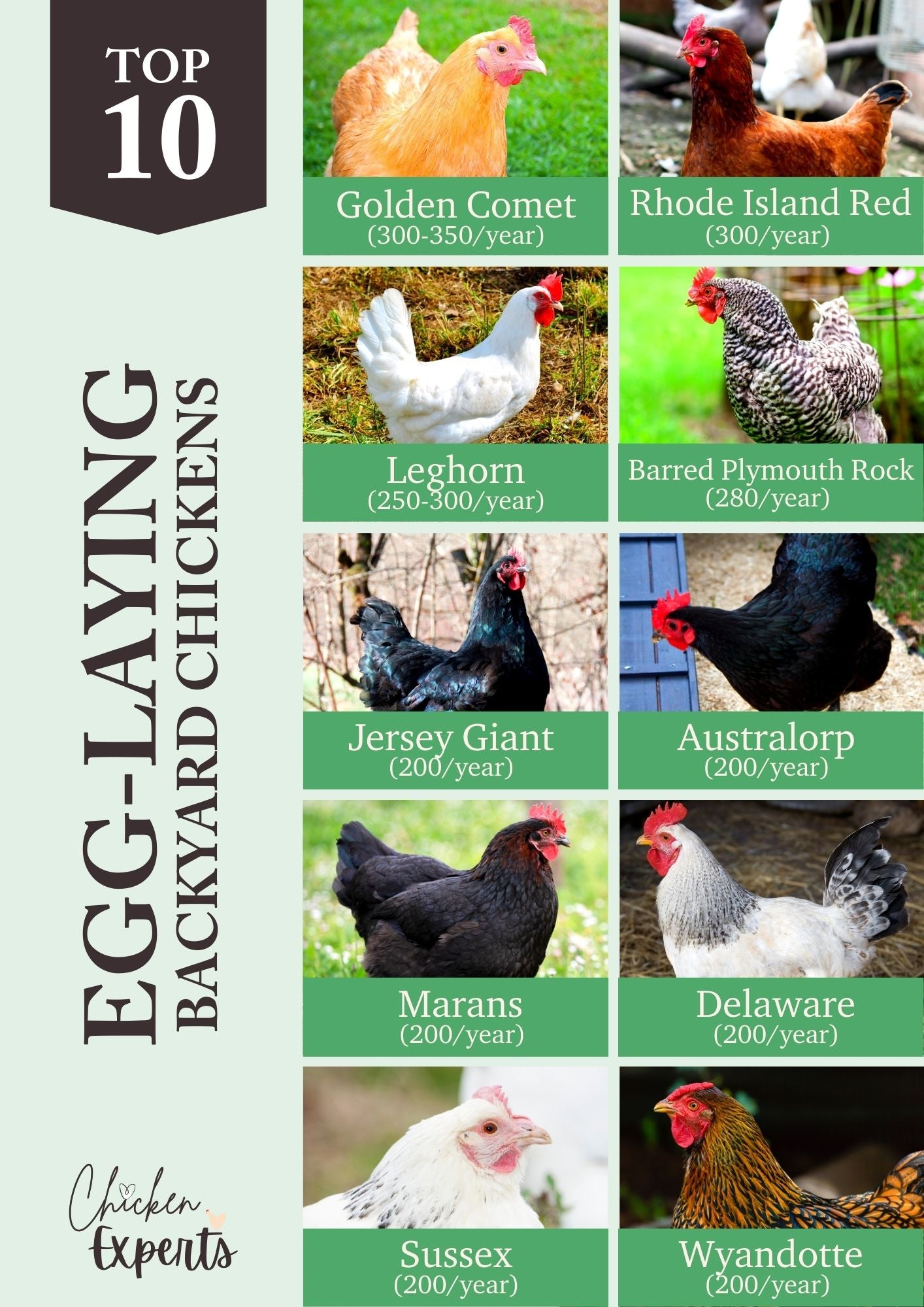
The 10 Friendliest Backyard Chicken Breeds:
If you’re lusting over chickens as pets and not just egg vendors, then their temperament is going to be just as important – if not more important – than their looks or laying abilities.
If you're craving a coop-mate who's up for copious cuddles, then selecting a chicken breed with an affectionate temperament is a no-brainer. If you have kids and you want them to get hands-on with the hens, then finding a friendly chicken is really important.
Chickens are individuals, and you're never guaranteed a certain character trait, but some breeds are more likely to become snuggle buddies than others.

- Silkie Chicken
- Rhode Island Red Chicken
- Buff Orpington Chicken
- Sussex Chicken
- Cochin Chicken
- Wyandotte Chicken
- Jersey Giant Chicken
- Easter Egger Chicken
- Faverolles Chicken
- Austrolorp Chicken
Bantams as Backyard Chickens
Bantams are not a breed of chicken. They’re cute, miniature varieties of breeds which is why they’re not in the top 10 breeds listed above. But…they’re brilliant backyard birds.
Bantam chickensand smaller breeds are perfect as backyard chickens since they need less space, so you can have a larger flock than you might have room for if you pick standard-sized breeds.
Bantams’ characteristics and egg stats mirror those of their full-sized feathery families. They’re just mini-mes, and their eggs are smaller. Bantam chickens lay between 50 and 200 eggs a year. Just how many compact creations they will bless you with depends mainly on their breed.
Bear in mind though, that bantams are quite flighty, so they will need smaller but taller coops to allow them to stretch those ‘ickle wings.
The Best Backyard Bantam Chickens
This one is tough! If forced to pick the top 10 teeny chickens, then here’s my shout:
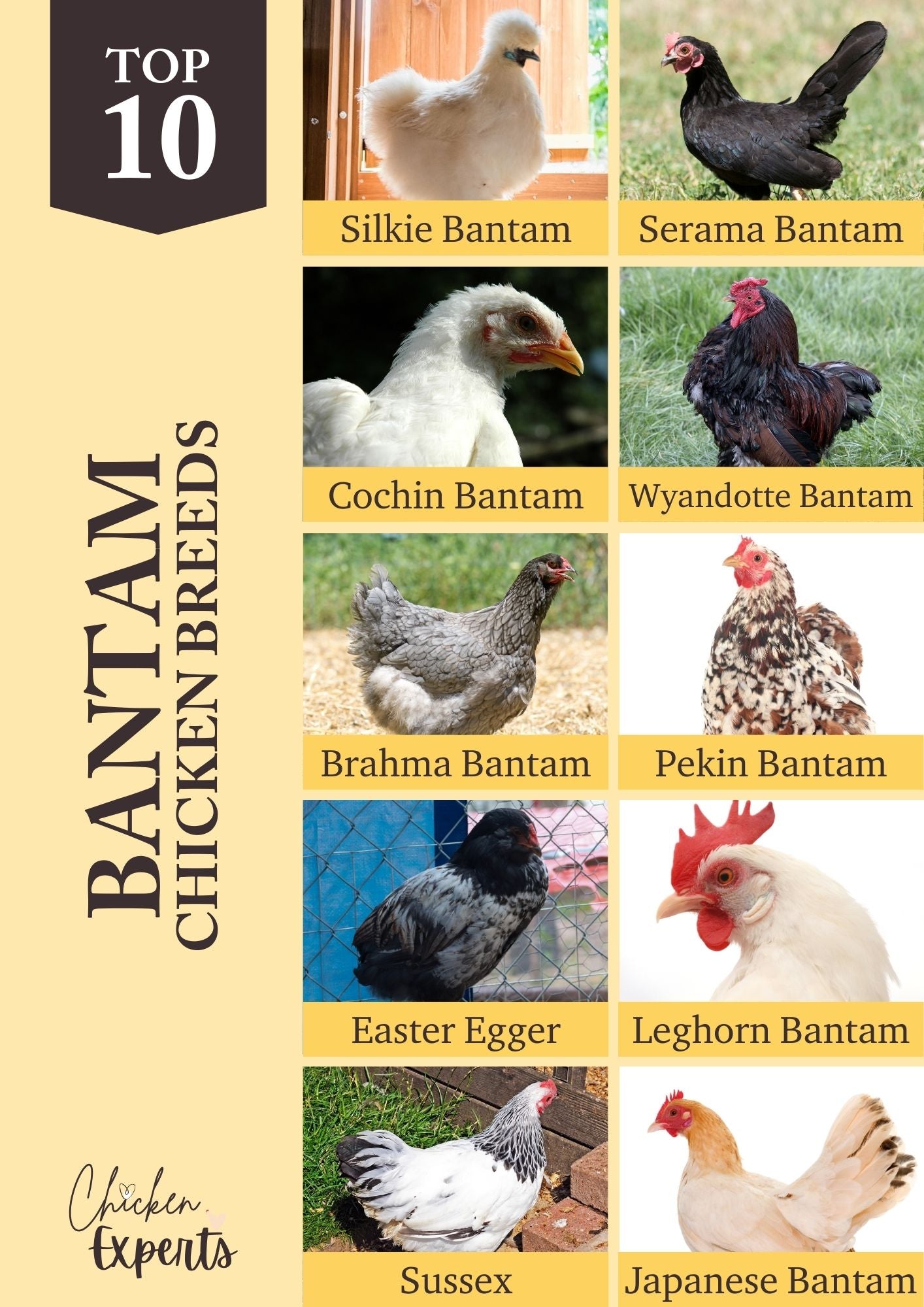
- Silkie bantam
- Serama bantam
- Cochin bantam
- Wyandotte bantam
- Brahma bantam
- Pekin bantam
- Easter Egger bantam
- Leghorn bantam
- Sussex bantam
- Australorp bantam
How Many Chickens Should I Buy?
How many chickens you bring home should be based on how much space you have to offer and how many eggs you’re hoping to harvest.
If you want everyone in your home to enjoy an egg a day, you could go for one productive breed like an Australorp, Marans, or Easter Egger per person, or three less productive chickens for every two people.
Do I Need a Rooster?
If you don’t want to breed chicks at home, then you don’t need a rooster. Roosters are sometimes kept as protection for hens, but there are less problematic and less noisy ways to protect your hens against predators than cocky cockerels.
If you don’t have a rooster, your girls will likely look after each other just fine.
Should I Buy Chickens or Hatching Eggs?
If you’re new to keeping backyard chickens, I’d recommend starting with sexed chicks or pullets.
Buying fertilized eggs to hatch at home is the cheapest way to buy birds, but you’ll need to invest time and money in hatching and raising baby chicks.
You might not get what you want in terms of hens or roosters, and there’s potential to hatch unhealthy chicks too, which can be soul-destroying.
Where To Buy Backyard Chickens
- A hatchery is the safest way to select chickens. They can tell you all about the bloodline and history of your chickens and hatcheries are better equipped than most to sex young chicks for you.
- You'll see chickens at the pet store from time to time, but you probably won’t be able to get a lot of background about your bird.
- It's always worth checking in with your local shelters and rescue centers to see if any chicks need a loving home.
- Having chickens from friends or acquaintances who know their chicken stuff can be a great option. You'll be able to meet the parents which can feel wildly reassuring.
- Hatching your chicks from hatching eggs (fertilized eggs) can be amazing if you're already comfy with these critters and have all the kit and the know-how. As a beginner though this might be one step too far.
How To Pick a Healthy Backyard Chicken
When you’re looking at chickens of any age there are a few signs to look out for to make sure you have the best odds of a good egg.
- Healthy chicken should be busy: active, exploring, scratching, and pecking.
- Healthy chickens should have clean, bright eyes and clear nostrils: no discharge.
- Healthy chickens should have straight beaks where the two halves fit neatly on top of one another.
- Healthy chickens should have strong legs and toes, all present and correct.
- Birdy bottoms should be clean. Maybe not squeaky clean because they’re babies after all, but not overly dirty.
Ex Battery Hens as Backyard Chickens
Rescuing hens from battery farms is an admirable thing to do, but they do come with a little baggage: usually, they have some sort of skin or health issues, and they are less likely to take to be handled since they’ve not had the best first impressions of us humans.
If you’re looking for chickens purely as pets and not produce-popping poultry, then rehoming retired layers – known as biddies – is a lovely thing to do and they’ll appreciate all the TLC that you can give them.
KEEPING BACKYARD CHICKENS – WHAT WILL YOU NEED?
What Do I Need to Buy for Backyard Chickens?
-
A Coop
Chicken coops come in all shapes, sizes, and styles to suit all budgets. You needn’t even buy one. You can build your own or repurpose a shed or playhouse. So long as your chicken coop provides security from the elements and predators then your chickens will be happy.
-
A Run
Unless your chickens can free-range all day, then they’ll need a secure run. This can be as simple as a box made of chicken wire, but you’ll need to make sure the sides are tall enough to stop chickens from getting out or anything else getting in.
-
Bedding/Litter
You’ll need to line your chicken’s run with litter and their nesting box with bedding. There are all sorts of materials available and recycling options to consider.
-
A Heat Source
If you have young chicks or summer from cold periods, then you need a safe and adjustable heat source to keep your hens happy and laying. They won’t bother if they’re not cozy.
-
Chicken Feed
The type of chicken feed that you need will change as your chickens grow. Laying hens and pullets need different feeds, and roosters and broilers need unique food supplies too. Check out my chicken feed blog to learn all about your chicken feed needs. Here’s a taster of what you’ll learn:
-
Water
This one's easy at least. They’ll need clean water and lots of it.
-
A Feeder
A decent chicken feeder will save you time, mess, money, and sick chicks!
- A Waterer
Chicks can drink 3 times their body weight and have no table manners at all. They'll need a constant supply of fresh water. Here’s a speedy guide to what to look for with chicken waterers.
-
Grit
Your chickens will need grit. It’s not to eat, though it does go in, it’s a tool to aid your chicken’s digestion.
-
Supplements
Chickens, like humans, benefit from certain supplements. They’re not strictly necessary, but to give them the best quality of life and you the best quality of eggs, they’re well worth including in your chicken’s nutrition.
-
Help
Don't wait for something scary to happen to decide on your emergency plan. Line up a great vet and join a reputable chicken community like Chickenpedia. When you have questions or worries, you'll have unlimited access to courses, poultry peers, expert information, and one-to-one support. All at a fraction of the cost of a vet trip.
What Do Backyard Chickens Eat?
90% of your chicken’s diet will be made up of a complete chicken feed. Homemade or store-bought, it doesn’t matter. What matters most is what makes up your chicken’s feed. So long as you match the content of their feed (especially protein and calcium levels) to the stage in your feathery friend’s life, you’re doing great!
Stage-specific chicken feeds are a safer bet than all flock feeds, which contain an average protein level for chickens, ducks, and geese for example around 16% - 22%. It’s not going to suit chicks or laying hens, but you could pullet off for pullets!
Good quality layer feed will include extra vitamins like vitamins A, E, D3, and B12, and trace minerals like phosphorus and copper sulfate. Some even contain a dose of omega-3, which does little for the hens, but makes their eggs healthier to eat.
How Much Do Backyard Chickens Eat?
Chickens will chomp are half a cup (¼ lb) of chicken feed per day.
The amount your chickens will gobble up will depend on their age and activity levels, but most of all their breed. A Jersey Giant rooster will need much bigger portions than a Silkie bantam pullet.
Chickens will tell you how much they want to eat. It’s best to feed them more than you think they’ll need, and you’ll soon be able to judge their appetites by their leftovers.
Chickens rarely overeat, and obesity is only an issue if they’re broiler breeds or unable to exercise.
Being able to eggs-timate how much feed to buy, or to make, can really help with budgeting.
Chicks 1-ounce starter feed a day
Pullets 2-3 ounces grower feed per day
Laying Hens 3.5 - 4 ounces layer feed a day
Roosters 6-8 ounces a day
Bantams 1-1.5 ounces feed per day
Which Waterer Should I Buy?
Chickens chug a crazy amount of water for their size, and just 24 hours without fresh water can be fatal for them, or at the very least detrimental to their health and egg laying.
A good choice of waterer, or drinker, will make the difference between serving up a healthy tipple or a bacteria broth.
The perfect chicken waterer needs to hold enough water for your thirsty flock whilst keeping their water contained, fresh, clean, and cool (but never frozen). You need to be able to lift it, fill it, and clean it. It also needs to fit into your coop, and into your hectic day.
Do Backyard Chickens Get Sick Lots?
One of the toughest parts of keeping chicks is that sometimes they do get poorly. Sometimes, worse. It’s not something we like to think about, but having a plan, or knowing where to turn if something sad does happen, will help you manage the tougher life lessons of raising chicks.
If you have kids along for the journey, being prepared and grounded rather than shocked and panicked can help them learn this lesson with a more grounded understanding.
Some first-time chicken keepers leave deceased chicks with their brood-mates for a while whilst they research what to do, thinking their siblings can say goodbye. Taking a course before bringing home your fluff babies will help you act quickly when it counts.
“The first thing to do would be to remove the body as soon as you discover it. The next would be to determine the cause of death as some chick diseases and illnesses spread quickly through a flock and may be affecting some of your other babies as well. Once you’ve removed the body, it is important to thoroughly clean the brooder and disinfect it with an ammonia-free cleaner.” (Chickenpedia’s baby chicken course)
IT’S CLUCK O’CLOCK! TIME TO GET PREPARED.
Once you've decided that your backyard is about to have some egg-citing new inhabitants, you'll need to know how to prepare for and care for your new poultry pals. Eeeek, it’s so exciting!
So, let’s do egg-sactly that! Here’s a little reading list to help you on your chicken journey!
Poultry parenting requires a network, especially if you’re new to it. You'll want to know how to change your chicken's feed and housing to suit their development, whether all that weird stuff they're doing (or pooping) is normal, and how to help keep them happy and healthy.
Chickenpedia offers the perfect suite of courses to help you fly through poultry parenting rather than scratching around for information.











Leave a comment (all fields required)